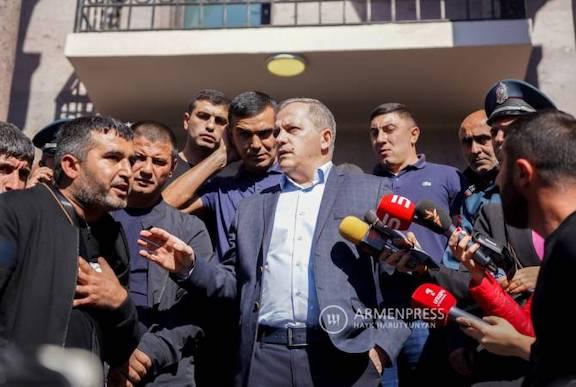Pashinyan government facing fresh challenges from Karabakh Armenians Armenia's political landscape at a crossroads/VIDEO
In Armenia, a fresh bid to destabilize the Pashinyan government has emerged, with the active involvement of Karabakh Armenians. This recent undertaking marks a deliberate and coordinated attempt to destabilize the Pashinyan government, bolstered by the backing of Karabakh Armenians, who aligned themselves with forces seeking instability in the South Caucasus region, concocting various schemes to sow chaos and discord.
Within Armenia, there is a prevailing sentiment favoring stability over the tumult incited by fringe ultranationalist factions. These factions, often fueled by external instigators, seek to disrupt the peace and stability of this nation, which boasts a population of fewer than three million.
Conversely, the opposition forces, with a pro-Russian inclination, in tandem with disjointed ultranationalist factions aligned with former officials linked to ex-presidents Robert Kocharyan and Serzh Sargsyan, seem to have come to terms with their ineffectiveness.
Consequently, they, along with various Armenian Diaspora groups beyond Armenia's borders, persist in bolstering power centers to perpetuate the circulation of futile documents aimed at keeping the Karabakh issue on the agenda of Western powers.
However, the flurry of futile resolutions, from the French Senate to deliberations in the corridors of Western parliaments, aimed at reverting the situation and compelling Azerbaijan to repatriate ethnic Armenians, will yield naught but sorrow and remorse for those resorting to extreme measures to achieve their ends.
Azerbaijan's terms for the return of ethnic Armenians to Karabakh are unequivocal. There should be no doubt that Baku may decide to allow Armenians to return only under the condition that they accept Azerbaijani citizenship and pledge allegiance to Azerbaijan as law-abiding citizens among others. These terms are clearly articulated at the highest echelons of authority.
Shahramanyan's calculated move to reignite Karabakh separatism
Taking into consideration the recent developments, including the initial protest staged by a faction of Karabakh Armenians in central Yerevan a few weeks prior, it appears that the former separatist leader of the now-defunct Karabakh region, Samvel Shahramanyan, buoyed by nationalist sentiments both within and outside Armenia, has embarked on yet another endeavor to thrust the Karabakh issue back into the limelight.

This calculated move seems designed to not only sustain the prominence of the matter but also to foment dissent within Armenia, particularly amidst the deepening schism with Russia, exacerbated by Yerevan's increasingly pro-Western stance.
Drawing inspiration from nationalist fervor resonating both domestically and abroad, Shahramanyan's actions suggest a concerted effort to exploit simmering tensions and capitalize on the precarious geopolitical dynamics at play. The tension arises as the Pashinyan government takes decisive steps to convince the West of its commitment to closely integrate with Pan-European institutions.
By orchestrating another protest, he seeks to sow seeds of discord and instability within Armenia, thereby destabilizing the political landscape and potentially undermining the authority of the Pashinyan government. The convergence of these factors underscores the intricate interplay of nationalist sentiments, geopolitical alignments, and internal fissures within Armenia, further complicating an already volatile situation.
As Armenia finds itself at a crossroads, navigating the delicate balance between regional alliances and domestic stability becomes increasingly precarious, with the specter of external interference looming large.
In a recent development, Armenian Prime Minister Nikol Pashinyan has issued a stern warning regarding the possible arrest of Karabakh separatist leader, Samvel Shahramanyan. This announcement comes in the wake of Shahramanyan's assertion of leadership over the virtual entity, known as the "NKR" (Nagorno-Karabakh republic), as detailed in an interview with French newspaper Le Figaro.
Shahramanyan contends that a decree he enacted in Khankendi in September 2023, aimed at dissolving the separatist regime, has been deemed illegal. According to his claims, the so-called "NKR" and its government now operate from Yerevan, effectively functioning as a state and government in exile.
This unfolding scenario underscores the complexity of post-conflict dynamics in the region, as well as the ongoing struggle for legitimacy and authority among various factions.
The timing of this statement coincides with reports from Baku and Yerevan suggesting a historic opportunity for signing a peace deal, which undoubtedly will incense Azerbaijan. Armenia's harboring and support of Karabakh separatists, allowing them to level accusations against Azerbaijan, both plausible and implausible, may hinder efforts to achieve the long-awaited peace.
Pashinyan's warning signals a potential escalation in tensions, with implications for Armenia's internal stability and its relations with neighboring Azerbaijan. Shahramanyan's proclamation highlights the enduring challenges surrounding the Karabakh issue, including unresolved political grievances and competing claims to governance.
Moreover, his assertion of a government in exile raises questions about the efficacy of legal frameworks and the enforcement of state authority in contexts of protracted conflict and political upheaval.
As Armenia navigates this delicate terrain, the necessity for diplomatic finesse and proactive measures to address underlying grievances becomes increasingly apparent. Official calls from Baku at various levels underscore the timeliness and vitality of this reminder.
The implications of Shahramanyan's statements extend beyond mere legal or political ramifications, serving as a potent reminder of the enduring complexities inherent in post-conflict transitions and the imperative of sustainable peace-building efforts.
Cognizant of Baku’s firm demands, Armenian Prime Minister Nikol Pashinyan has responded with vigilance to the recent actions of Samvel Shahramanyan, expressing concern over their potential ramifications for national security.
Notably, Shahramanyan's decision to grant an interview to Le Figaro, a newspaper known for its biased stance against Azerbaijan, is seen as part of a broader agenda originating from the Elysee Palace. This move has further strained the already tense relations between Azerbaijan and France, exacerbating hostilities on a diplomatic level.
Shahramanyan's conspicuous absence from Armenian media and public engagements contrasts sharply with the visible presence of other separatist figures who have relocated from Karabakh to Armenia. These individuals have assumed leadership roles, utilizing their platforms to slam the Armenian government's policies, particularly regarding housing initiatives for displaced Armenians from Karabakh.
Of particular contention is the government's housing program, which provides financial assistance to families relocating from Karabakh to Armenia. Each family member who accepts Armenian citizenship is eligible for approximately $7,500 to aid in resettlement. However, separatist figures decry the requirement of obtaining Armenian citizenship as a condition for purchasing an apartment and argue that the state-provided amount is insufficient to meet the needs of displaced individuals.

Despite their grievances with the government's policies, separatist leaders advocate for the continued prioritization of the "Karabakh issue" on the global stage. They urge Armenian authorities not to neglect this critical matter and propose incorporating it as a precondition in negotiations with Azerbaijan.
In his interview with Le Figaro, Shahramanyan disclosed his decision to issue a directive aimed at dissolving the self-proclaimed "NKR" to facilitate the safe relocation of the population. Acknowledging the illegality of this directive from its inception, he explained that compliance with Baku's demands to dismantle the separatist "state" and relinquish its symbols was deemed necessary following ceasefire negotiations. Upon returning to Yerevan, Shahramanyan rescinded the directive, directing "NKR government members" to continue their duties voluntarily.
Moreover, Shahramanyan confirmed the existence of a "state and government in exile" during his interview, highlighting the location of the office building in Yerevan where the interview took place. This building reportedly housed offices for the president, as well as judicial and legislative bodies of the self-proclaimed "NKR."
Premier's warning unravels complexities of Karabakh separatism
During a session of the Armenian government, Prime Minister Pashinyan indirectly addressed the remarks made by Shahramanyan, urging the law-enforcement agencies to take decisive action. He unequivocally asserted the singular legitimacy of the government operating from the very building where the session convened.

Pashinyan's remarks were underscored by a stern warning against external forces exploiting certain factions to undermine Armenia's stability, emphasizing that any self-proclaimed "government" within the nation's borders would be considered a grave national security concern.
Pashinyan stressed the imperative for law-enforcement bodies to adopt stringent measures to thwart any unauthorized entities from laying claim to governmental authority, emphasizing the critical importance of neutralizing potential security threats posed by such entities. He reiterated that there exists, has existed, and will continue to exist only one recognized government in Armenia, dismissing any other assertions to leadership as both illegitimate and perilous.
In his concluding remarks, Pashinyan underscored the necessity of vigilance against actions aimed at destabilizing the government. It is noteworthy that Vardan Oskanyan, regarded as the leader of Karabakh separatists residing in Armenia, has established a public committee advocating for the repatriation of Karabakh Armenians under the assurance of international protection.
Oskanyan's efforts include active engagement with Western circles to reignite the Karabakh conflict, leveraging his connections within the Armenian diaspora and his rapport with influential European politicians cultivated during his tenure as Armenia’s foreign minister.
Moreover, there exist revanchist groups in Armenia and opposition parties aligned with Russia, which are mobilizing Armenians who have relocated from Karabakh to oppose the Pashinyan administration. A recent gathering organized by Armenians from Karabakh in Yerevan ostensibly focused on social issues but predominantly advocated for the repatriation of Armenians to Karabakh under international guarantees. However, speakers at the event conceded that achieving this objective is currently deemed unfeasible.
Armenia’s political landscape is being challenged by multifaceted issues, characterized by tensions stemming from separatist sentiments, geopolitical alignments, and domestic opposition. Pashinyan's statements reflect a firm stance against any attempts to undermine the established governmental authority, while the activities of various factions reveal the complex interplay of interests and agendas at play within Armenian society.








